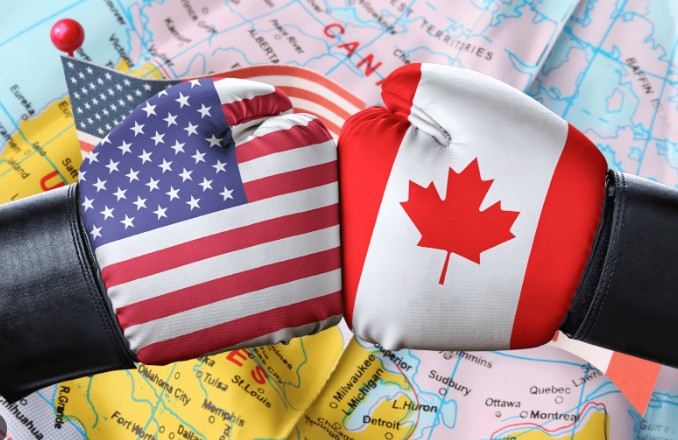
A Sudden Escalation in North American Trade
On July 10, 2025, U.S. President Donald Trump announced a sweeping 35% tariff on all Canadian imports, effective August 1. The move stunned policymakers and markets alike, reviving tensions between two of the world’s most tightly integrated economies. Trump accused Canada of “retaliatory tariffs,” “economic warfare,” and failing to curb the flow of fentanyl across the northern border.
The tariff is part of Trump’s broader “Liberation Day” economic agenda, which includes new duties on Japan, South Korea, and copper imports. But the Canada announcement stands out for its scope, symbolism, and potential fallout. It targets all Canadian goods, regardless of sector, and threatens further hikes if Canada responds in kind.
This move puts small and medium-sized enterprises (SMEs) on the front lines of a trade confrontation between Canada and the U.S. At Peacock Tariff Consulting, we specialize in helping SMEs assess tariff exposure, optimize supply chains, and secure market access. Reach out if you have questions or need tailored support.
Political Context: From Digital Taxes to Drug Diplomacy
The Digital Services Tax Dispute
- Canada’s now-rescinded digital services tax would have charged U.S. tech firms up to $3 billion annually.
- Trump called it an “attack” on American innovation and terminated trade talks in late June.
- Canada backed down on June 29, but tensions remained high.
Fentanyl Allegations and Border Politics
- Trump accused Canada of contributing to the U.S. opioid crisis, citing fentanyl trafficking.
- Canadian officials called the claims “unjustified,” but Trump tied tariff relief to Canada’s cooperation on drug enforcement.
Supply Management and Dairy Disputes
- Trump slammed Canada’s supply management system, citing 400% tariffs on U.S. dairy exports.
- He called the imbalance a “threat to our economy and national security.”
Economic Impact on Canada: Sector-by-Sector Breakdown
Automotive: Ontario’s Engine Stalls
Canada’s auto sector is deeply tied to U.S. supply chains. The tariff threatens to upend this integration.
| Product | U.S. Dependency | Impact |
| Auto Parts | $22B exports | Plants may idle; layoffs likely |
| Finished Vehicles | $9B exports | Price hikes; Detroit may shift sourcing |
| EV Batteries | Emerging sector | Investment slowdown |
Industry reaction: The Canadian Vehicle Manufacturers’ Association warns of “massive disruption.” Ontario Premier calls for federal subsidies to offset losses.
Energy and Natural Resources: Alberta’s Pain Point
Canada is a major energy supplier to the U.S., especially in oil, gas, and electricity.
| Resource | U.S. Share | Tariff Effect |
| Crude Oil | 3M barrels/day | May be rerouted to Asia |
| Electricity | Quebec exports | Grid instability in New England |
| Lumber | $8B/year | Housing costs may rise in U.S. |
Industry reaction: Alberta’s energy firms warn of “billions in stranded assets.” U.S. homebuilders brace for lumber shortages.
Agriculture: Prairie Provinces Under Pressure
Canadian farmers rely heavily on U.S. buyers for grains, meat, and specialty crops.
| Product | U.S. Market | Risk |
| Wheat & Barley | 40% exports | May shift to EU or China |
| Beef & Pork | $3B exports | Ranchers face steep losses |
| Maple Syrup | Cultural icon | Niche but symbolic impact |
Industry reaction: The Canadian Federation of Agriculture calls the tariff “devastating.” Farmers demand emergency aid.
Impact on the U.S.: Consumers, Manufacturers, and Trade Stability
Consumer Prices: Sticker Shock Ahead
American households will feel the impact in everyday goods:
- Lumber: Home construction costs may rise 10–15%
- Electricity: Northeastern states may face higher rates
- Food: Beef, pork, and maple syrup prices could spike
Manufacturing: Supply Chain Disruption
U.S. industries that rely on Canadian inputs face cost hikes and delays:
| Sector | Dependency | Risk |
| Automotive | Parts, steel | Production delays |
| Aerospace | Aluminum, engines | Contract renegotiations |
| Construction | Lumber, cement | Project slowdowns |
Stock market reaction: S&P 500 futures fell 0.5% after Trump’s post; Dow dropped over 200 points.
Northern U.S. States: Regional Challenges
The northern U.S. states, particularly those bordering Canada, face unique challenges:
| State | Dependency | Impact |
| Michigan | Auto parts, finished vehicles | Job losses in manufacturing hubs |
| New York | Electricity, dairy | Higher energy costs; strained dairy supply |
| Vermont | Maple syrup | Price hikes; reduced availability |
| Minnesota | Wheat, barley | Increased costs for food processors |
Regional reaction: Governors of Michigan and New York have called for federal aid to mitigate the impact. Local businesses warn of layoffs and reduced competitiveness.
Diplomatic Fallout and Global Trade Consequences
Canada’s Response: Retaliation or Restraint?
- Canada may invoke reciprocal tariffs, targeting U.S. tech, agriculture, and energy.
- Prime Minister Mark Carney has not issued a formal reply, but negotiations are ongoing until July 21.
Trade War Risks
- Experts warn of a full-blown trade war, with cascading effects across North America.
- The U.S.–Mexico–Canada Agreement (USMCA) may be tested or bypassed.
Global Repercussions
- Other nations may reconsider trade deals with the U.S.
- Trump’s “Liberation Day” agenda signals a shift toward economic nationalism.
Conclusion: A Tariff That Could Redefine North American Trade
Trump’s 35% tariff on Canadian imports is more than a trade policy it’s a strategic shockwave aimed at reshaping the economic relationship between two of the world’s closest allies. It weaponizes tariffs to achieve political goals, from drug enforcement to digital taxation, and signals a new era of transactional diplomacy.
For Canada, the stakes are enormous. Key industries automotive, energy, agriculture face billions in losses, and the broader economy may contract if retaliatory measures escalate. The tariff also threatens Canada’s reputation as a stable trade partner and could push it closer to the EU and China.
For the U.S., the move may backfire. Consumers will pay more, manufacturers will scramble to replace Canadian inputs, and diplomatic trust may erode. The tariff also risks undermining the USMCA and destabilizing North American supply chains.
Politically, the tariff reflects Trump’s willingness to bypass traditional diplomacy in favor of direct economic pressure. It sets a precedent for “tariff ultimatums”, where trade penalties are tied to unrelated policy demands. This could embolden other leaders to adopt similar tactics, weakening the rules-based global trade system.
In the long run, this episode may mark a turning point in U.S.–Canada relations. It challenges decades of cooperation and forces both countries to reconsider their economic interdependence. Whether cooler heads prevail or the conflict escalates into a prolonged trade war will depend on the next few weeks of diplomacy.
But one thing is clear: the 35% tariff is not just a number it’s a signal that the era of quiet trade diplomacy may be over. So you ask how can Peacock Tariff Consulting Help……
At Peacock Tariff Consulting, we transform uncertainty into opportunity by arming SMEs with the insights, tools, and hands-on support they need to not only survive but thrive. Our Commitment to Your Success:
Customized Tariff-Impact Reports
We analyze your specific products, tariff codes, and markets to forecast cost exposures down to the penny giving you clear projections for budgeting and pricing strategy.
Hands-On Workshops in Supply Chain Diversification
Through interactive sessions, we map out backup suppliers, alternative logistics routes, and inventory-speed drills so you’re never caught flat-footed.
Duty Recovery and Cash-Flow Optimization
From duty-drawback programs to tariff reclassification appeals, we identify every rebate and refund opportunity to put cash back in your pocket.
Step-By-Step Guidance on Subsidies and USMCA Disputes
We guide you through federal aid applications, provincial grant programs, and if needed, USMCA arbitration making complex processes straightforward and time-efficient.
Ongoing Trade-Policy Monitoring & Compliance Support
Our real-time alerts and quarterly policy briefings keep you ahead of sudden tariff tweaks, sanctions, and customs rule changes.
Whether you export handmade crafts to the U.S., operate a family-owned grain mill in the Prairies, fabricate niche auto components in Ontario, or manage a boutique construction outfit in northern New England, we’re your trusted partner every step of the way.
Next Steps for SMEs
- Schedule your complimentary 30-minute strategy session.
- Receive a preliminary risk assessment within 48 hours.
- Work with your dedicated advisor to build a tailored action plan.
Don’t let tariff shocks erode your margins or stall your growth. Contact Peacock Tariff Consulting today and gain the competitive edge you deserve.
We look forward to helping your SME adapt, compete, and thrive in this new era of trade.
